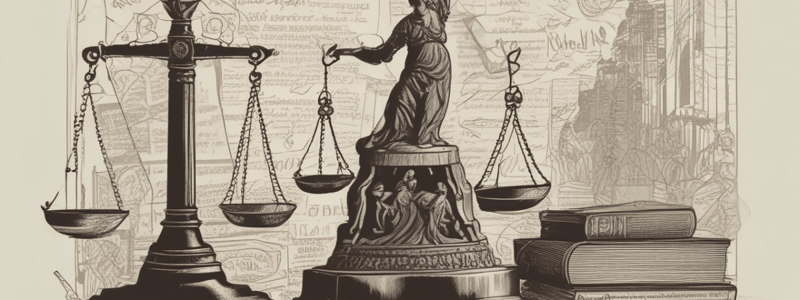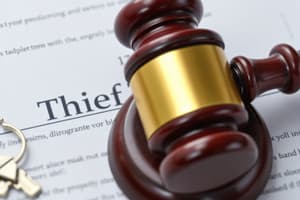Podcast
Questions and Answers
What is the primary focus of the Theft Act?
What is the primary focus of the Theft Act?
- To distinguish between larceny and embezzlement
- To establish the minimum penalty for summary offenses
- To define the concept of property
- To outline laws and penalties related to theft and related offenses (correct)
What is the key characteristic of larceny?
What is the key characteristic of larceny?
- The unlawful taking of property with the intention of permanently depriving the owner (correct)
- Receiving or disposing of stolen property, knowing it to be stolen
- Obtaining property by means of deception or false representation
- The fraudulent conversion of property by a person who has been entrusted with it
What is the term for the physical act of taking the property in a theft offense?
What is the term for the physical act of taking the property in a theft offense?
- Duress
- Actus reus (correct)
- Claim of right
- Mens rea
What is a possible defense to a theft charge?
What is a possible defense to a theft charge?
What type of offense is punishable by fines and/or imprisonment?
What type of offense is punishable by fines and/or imprisonment?
What is the term for receiving or disposing of stolen property, knowing it to be stolen?
What is the term for receiving or disposing of stolen property, knowing it to be stolen?
What is the actus reus of theft?
What is the actus reus of theft?
What is the required mens rea for theft?
What is the required mens rea for theft?
What is the standard for determining dishonesty in theft?
What is the standard for determining dishonesty in theft?
What is the effect of a genuine belief in consent on theft liability?
What is the effect of a genuine belief in consent on theft liability?
What is the requirement for a claim of right to be a valid defense to theft?
What is the requirement for a claim of right to be a valid defense to theft?
What is the effect of conditional intent on theft liability?
What is the effect of conditional intent on theft liability?
Flashcards are hidden until you start studying
Study Notes
Theft Act
The Theft Act is a legislative framework that outlines the laws and penalties related to theft and related offenses. Here are the key concepts and provisions:
Definition of Theft
- Theft is defined as the unauthorized taking of property with the intention of permanently depriving the owner of it.
- Property includes money, goods, and other valuables.
Types of Theft
- Larceny: The unlawful taking of property with the intention of permanently depriving the owner.
- Embezzlement: The fraudulent conversion of property by a person who has been entrusted with it.
- False pretenses: Obtaining property by means of deception or false representation.
Elements of Theft
- Actus reus: The physical act of taking the property.
- Mens rea: The intention to permanently deprive the owner of the property.
Penalties for Theft
- Summary offense: Less serious theft offenses, punishable by fines and/or imprisonment.
- Indictable offense: More serious theft offenses, punishable by imprisonment and/or fines.
Defenses to Theft
- Claim of right: The defendant genuinely believed they had a right to the property.
- Intoxication: The defendant was intoxicated at the time of the offense, but this may not be a complete defense.
- Duress: The defendant was coerced into committing the offense.
Related Offenses
- Handling stolen goods: Receiving or disposing of stolen property, knowing it to be stolen.
- Burglary: Entering a property with the intention of committing theft or other offenses.
- Robbery: Theft accompanied by violence or threats of violence.
Key Principles
- Dishonesty: The defendant must have acted dishonestly in order to be convicted of theft.
- Intention: The defendant must have intended to permanently deprive the owner of the property.
- Property: The property must belong to another person, and the defendant must have taken it without their consent.
Studying That Suits You
Use AI to generate personalized quizzes and flashcards to suit your learning preferences.




